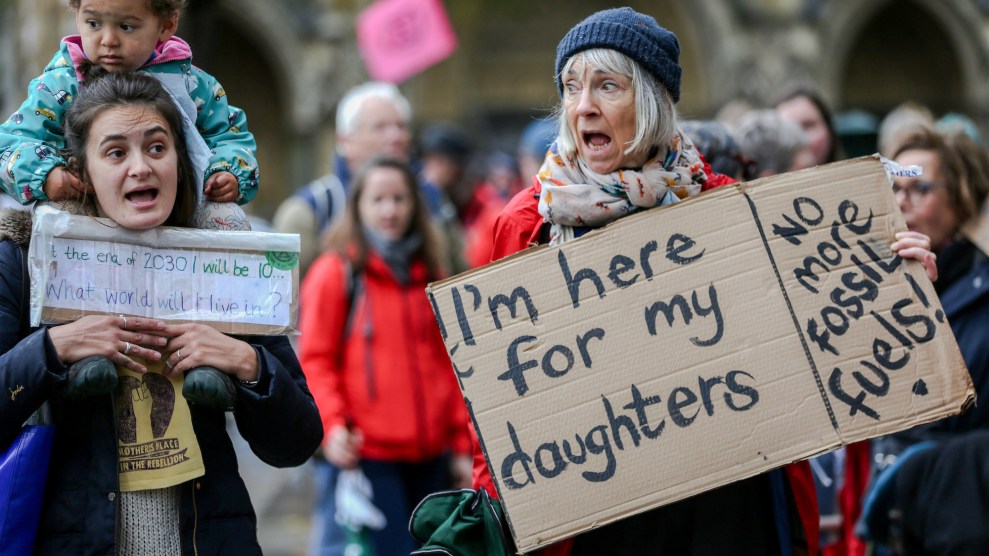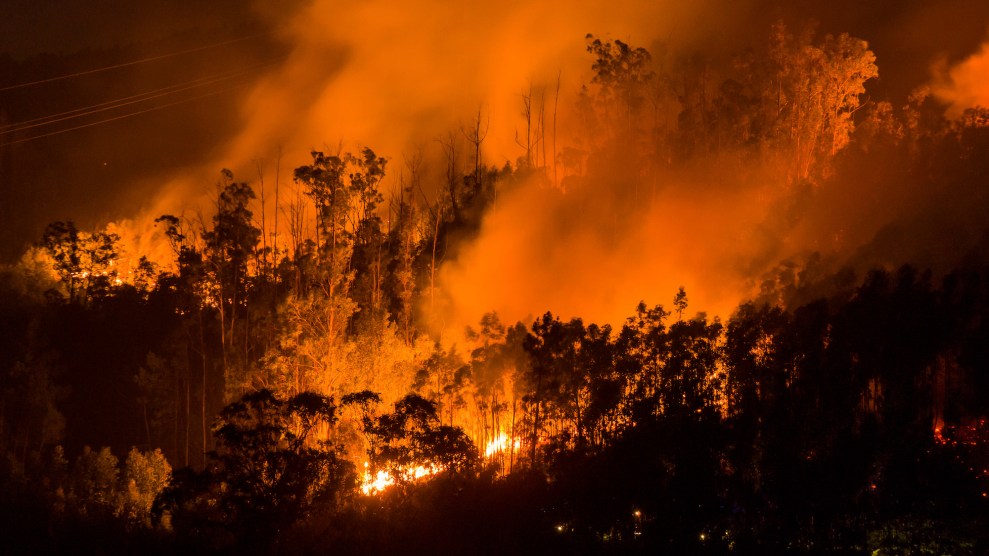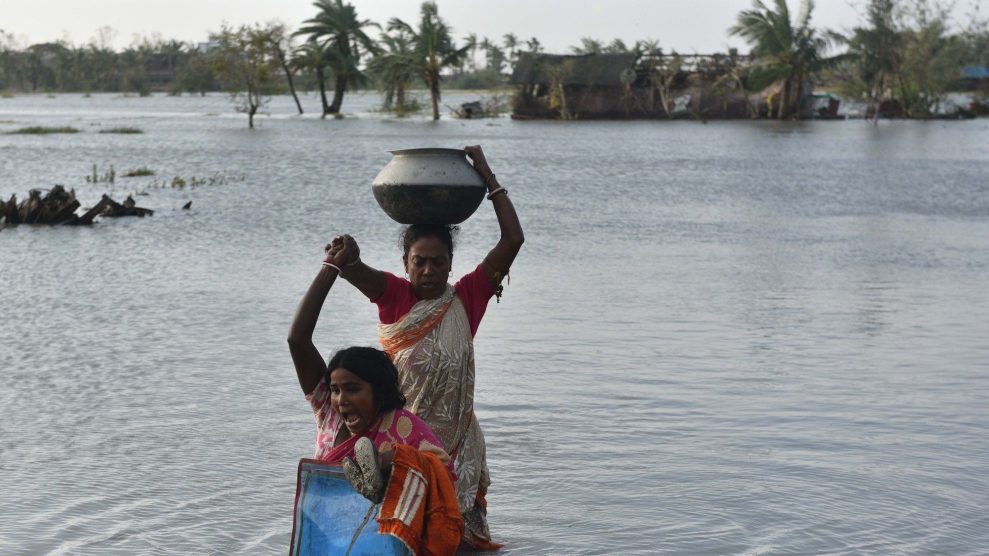
Switzerland's Anne Mahrer, co-president of KlimaSeniorinnen, demonstrates outside the European Court of Human Rights in Strasbourg, France with other Swiss retirees. Jean-Francois Badias/AP
This story was originally published by the Guardian and is reproduced here as part of the Climate Desk collaboration.
The women, mostly in their 70s, strode up the mountain with dogged grace. Clacking their hiking poles against sun-cooked rocks, they set sure feet on shaky stones and held hands to cross slippery streams. They knew the heat and strain were a threat to their health – they were perhaps uniquely aware of the risks – but they did not plan to let it limit their lives.
“I’m a mountain climber,” said 73-year-old Pia Hollenstein, brushing away the hand I offered to help her down a big rock. “I can manage.”
Switzerland’s KlimaSeniorinnen, or senior climate women, are not who most people think of when they talk about those on the frontlines of the climate crisis. The 2,400 members of the group live in one of the richest countries on Earth. Due to their age—the youngest is 64—they will witness just a fraction of the extreme weather that their generation’s children and grandchildren will see.
But these retirees are among those fighting hardest for a livable future. The women are suing the Swiss government in Europe’s top court for violating their human rights with policies that do too little to stop the planet from baking. Their case, which could send shock waves through courts across the continent, rests on two simple facts. Heatwaves are getting hotter as people burn fossil fuels. And women, particularly older ones, are more likely to die when temperatures soar.
“When they asked me to join, I thought Swiss politics was hopeless,” said Hollenstein, a retired nurse and former Green party member of parliament who sits on the board of the KlimaSeniorinnen. “But this is an important lever.”
On a Monday morning in August, I joined Hollenstein and several of her co-plaintiffs for a hike around the Göschener Lake in the Alps. High in the mountains—a core part of Switzerland’s identity and the bedrock of its tourism and energy sectors—we looked out at breathtaking scenery, alpine wildlife, and a hydroelectric dam. The women had chosen the spot to show what would be lost as the glacier melts.
What they hadn’t chosen was the weather. That morning, Swiss scientists had found that the zero-degree line—the height at which temperatures drop below freezing – had hit its highest level yet. Two days earlier, the national weather agency had issued heat warnings for most of the country. A tabloid newspaper carried an interview with a meteorologist about weather alerts. On its front page, it warned: “The heatwaves are just getting started.”
The KlimaSeniorinnen had paid attention to the news but had not been put off by it. They came with bottles of water, trekking poles, and sensible shoes. Beatrice Braun, an artist, told me she had knitted the multicolored hiking socks on her feet. The women were mindful of the limits of their bodies but said they preferred cool mountain air to the stifling city heat. Only at times did the warmth of the sun and the strain of the hike cause concern. “I have the same problem as the glacier,” said Annemarie Ulmi-Klieber, pointing at the sweat running down her face. “I’m melting.”
Heat, doctors warn, is far more dangerous than people realize. In periods of hot weather, some victims drop dead when working or living outdoors. Many more die in retirement homes and hospitals, their frail bodies weak from the weather and unable to fight off diseases that hurt the heart, lungs, and kidneys. Heat killed an extra 70,000 people across Europe last year, according to the latest analysis of mortality and temperature data, and the death toll this year, the hottest on record, may prove higher still.
“Based on current evidence from epidemiological studies, older women are particularly vulnerable to heat,” said Ana Vicedo-Cabrera, who leads the climate and health team at the Institute of Social and Preventive Medicine at the University of Berne, and summarised the state of the science for the court. The reasons why are unclear, she said, but “changes in the cardiovascular system due to menopause or the fact that older women tend to be more active than men have been proposed as potential reasons”.
In that sense, the case brought by the KlimaSeniorinnen is a strategic one. First proposed a decade ago by campaigners from Greenpeace, it tackles an issue that has held back climate litigation across the world: because the climate crisis hurts everyone, rather than targeting a particular person or group, courts would be overwhelmed if they admitted every case brought by individuals against big polluters.
What the Swiss lawyers needed was a group of people—the narrower the better—who could argue not just that their right to life was being violated by rising temperatures, but that they were disproportionately affected. Scientists from across the world have shown that heat hurts women more than men, and old people more than young people. Vicedo-Cabrera and her colleagues found that older women in Switzerland died at the highest rates from heat in the summer of 2022. They worked out that 60 percent of the deaths would have been avoided in a world without the climate crisis.
But as I sweated up the slopes of the Swiss Alp, struggling to keep pace with women more than twice my age, I was surprised to hear that the KlimaSeniorinnen had not filed the case for their own benefit. Instead, they were thinking more about people my age.
“Our generation has done so much to destroy the climate. We have a responsibility,” said Hollenstein. “It serves everyone if we can successfully make Switzerland do more [to stop].”
After years of setbacks in regional and national courts, which threw the case out on procedural grounds, the KlimaSeniorinnen have taken their case to the European Court of Human Rights. The court has not previously ruled on government climate action but will hear the Swiss case along with similar cases from a French mayor and several Portuguese teenagers early next year. The results will open the door to cases in other countries if governments across Europe do not comply with the rulings.
Charlotte Blattner, a researcher at the University of Berne who specializes in climate law, said experts were hopeful that the process would enshrine milestones that nudged governments into more stringent climate policy through human rights guarantees. Still, she said, “The chances that the KlimaSeniorinnen will win this case on all grounds is very unlikely”.
In its statement to the court, the Swiss government said it was “perfectly legitimate” for members of the public to call on states to do more to combat global heating, but that the system around the European Convention on Human Rights had not been intended to become the place where national policies to combat global heating were decided. “Defining and choosing the measures to be taken is indeed a matter for the government, parliament, and people of Switzerland.”
The government also pushed back on the substance of the case, disputing that women of retirement age were automatically at higher risk from heatwaves.
Not all of the KlimaSeniorinnen will live long enough to see the outcome of their struggle—some members have already died and even a victory in Strasbourg does not guarantee change in policy. If they win the court case, they say they will pressure the government to come up with a plan to meet its targets, which will then be voted on in a referendum. The Swiss public voted through a target of net zero emissions by 2050 in a referendum in June but rejected a package of concrete policies to cut pollution in 2021.
Still, for the women, even getting a case to the 17 judges in the grand chamber of the European Court of Human Rights is a step they could have scarcely imagined as children. All of them were born—and some even came of age—at a time when women in Switzerland did not have the right to vote. They said they were glad to be making the most of the tools available to them.
“This group of women simply inspired me,” said Verena Steiner, who joined the group last year. The former architect said she had been “climate aware” for 40 years but only recently become more active.
The group said they were now also commanding more respect. Some people had dismissed them as “old wives” in the past but the reality of their plight had become harder to ignore.
“For a long time, we weren’t taken seriously,” said Rita Schirmer-Braun, who sits on the board. “But now they are slowly starting to take us seriously because they see what’s happening around us.”












